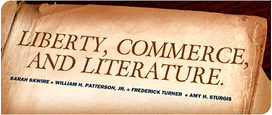Lead Essay
Literary scholar Sarah Skwire asks us to revisit the western canon’s portrayal of business and commerce. Mainstream scholars and libertarians both seem to agree that the “great books” portray business in a uniformly negative light, but Skwire finds the evidence for this contention to be thin. She proposes a much more nuanced view, in which critiques of the market stand side by side with favorable depictions and even sound, encouraging advice for would-be businessmen. It’s time to get beyond the clichés about literature and commerce.
Response Essays
William H. Patterson, Jr. reflects on the origins of liberty, commerce, and literature as we have come to understand them today. He finds that all three have a common root in the European Enlightenment. History, however, often comes in cycles or waves, and the fortunes of all three have risen and fallen over time. He expresses the hope that each of the three “at-risk children of the Enlightenment” will flourish in the coming decades.
Frederick Turner offers a structural explanation for why literary scholars have been so eager to supply anti-commercial readings to the western canon. Literary criticism began among gentlemen; it then passed to the anti-commercial meritocracy of the universities. But alternate readings exist, and Turner even offers a startlingly pro-commerical reading of The Merchant of Venice.
Amy H. Sturgis argues that much of the apparent anti-market bias in literature stems from elitism. By excluding genre fiction, mainstream literary critics also exclude many thoughtful and provocative treatments of markets and their place in political economy. Often the excluded works are highly sympathetic to libertarian ideals. Fiction shapes public opinion, including public opinion about markets, and popular fiction by definition reaches more than any other kind.
The Conversation
Related at Cato
- Book Forum: Robert A. Heinlein: In Dialogue with His Century, discussion with the author, William H. Patterson, Jr., (video)
- Essay: “Why Do Intellectuals Oppose Capitalism?” by Robert Nozick
- Blog Post: “Mario Vargas Llosa’s Nobel Prize,” by Ian Vásquez

